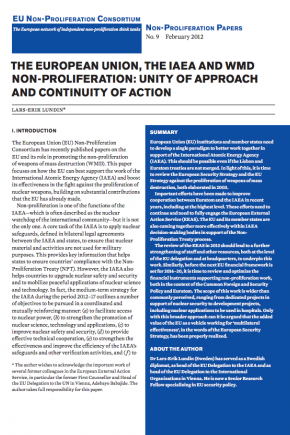The European Union, the IAEA and WMD Non-proliferation: Unity of Approach and Continuity of Action
European Union (EU) institutions and member states need to develop a single paradigm to better work together in support of the International Atomic Energy Agency (IAEA). This should be possible even if the Lisbon and Euratom treaties are not merged. In light of this, it is time to review the European Security Strategy and the EU Strategy against the proliferation of weapons of mass destruction, both elaborated in 2003. Important efforts have been made to improve cooperation between Euratom and the IAEA in recent years, including at the highest level. These efforts need to continue and need to fully engage the European External Action Service (EEAS). The EU and its member states are also coming together more effectively within IAEA decision-making bodies in support of the NonProliferation Treaty process. The review of the EEAS in 2013 should lead to a further strengthening of staff and other resources, both at the level of the EU delegation and at headquarters, to underpin this work. Similarly, before the next EU financial framework is set for 2014–20, it is time to review and optimize the financial instruments supporting non-proliferation work, both in the context of the Common Foreign and Security Policy and Euratom. The scope of this work is wider than commonly perceived, ranging from dedicated projects in support of nuclear security to development projects, including nuclear applications to be used in hospitals. Only with this broader approach can it be argued that the added value of the EU as a vehicle working for ‘multilateral effectiveness’, in the words of the European Security Strategy, has been properly realized.

